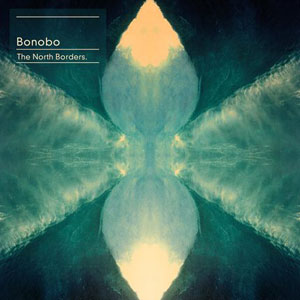Bonobo The North Borders
The time between the release of Bonobo‘s accomplished fourth album, Black Sands, in 2010 and […]

The time between the release of Bonobo‘s accomplished fourth album, Black Sands, in 2010 and this year’s The North Borders has been fruitful for the artist otherwise known as Simon Green. The one-time Brighton producer uprooted himself from his native UK and moved to New York, having found in the US a lucrative market for his cinematic, dense, and polyrhythmic jazzy-cool aesthetic. With mega “EDM” acts like Pretty Lights name-dropping Bonobo as a central influence, Green’s popularity has ballooned, leading to steady touring both as a live act and a DJ, all with a degree of success that would have been unimaginable when his pillowy beats debuted on the Tru Thoughts label back in 2000. Given Bonobo’s new level of exposure, one might expect a commercially minded shift in his sound, but The North Borders instead plays out as a linear and logical progression of his catalog to date.
Green has continued fine-tuning his musical identity here with the same deliberateness he’s always shown. Changes to his sound are often subtle; sometimes, they’re barely even audible. Tracing the Bonobo of 2013 back to his earliest days, the biggest advances come in quality of production, not in modification of style. While guttural groans, wobbles, and whatnot could have easily worked their way into the fold, we are instead greeted with the producer’s tried-and-true Rhodes, crackling soul, soothing cinematics, and pan-global swing. On “Sapphire,” a near-weightless combination of vibraphone, beatific harp, and purring woodwinds floats through the composition’s wide-open space, anchored by nothing more than a fragment of gossamer vocals and compressed drumming. It’s pristine Bonobo and a song that embodies the azure shimmer of its namesake well.
“Ten Tigers” jitters along with a stuttered boom and bap that offers subtle acknowledgement of his music’s place in a post-chillout world. Displaying more backbone than the jazzy flightiness of Black Sands, the track nonetheless refuses to give up its ambient twilight and dusky characteristics. But this steadfast dedication to his well-honed sound also forces Green to navigate a fine line between integrity and tired rehash. Tracks like “Jets,” with its lyrical coos, bass rumble, and straight-ahead breakbeat, not only sound like an oversimplified version of Bonobo’s best work, but also like a watered-down version of Pretty Lights. The North Borders succeeds best at shedding its weathered downtempo shackles when it pushes the tempo. “Emkay” is an uplifting prance through an organic soundscape of woodblock clacks, breathy saxophones, simmering strings, and a folksy sample that recalls something from the vintage RJD2 playbook. This spry pacing is interspersed throughout the LP, most notably during the enveloping warmth of lead single “Cirrus” and on “Know You,” with the tough-yet-understated tapping of a slightly broken beat and touch of techno-funk bravado. It’s not that Bonobo has never cracked 120 bpm before, it’s just that he’s seized on a welcome forcefulness here.
When Green isn’t committing time to tracks with discerning dancefloor potential, he’s penning beats for an always diverse collection of singers, the most notable among them being a high-profile collaboration with visionary soulstress Erykah Badu. The oblique meditation “Heaven for the Sinner” is a dose of edginess Green’s repertoire could use more of. Brooding opening track “First Fires,” featuring Cinematic Orchestra talent Grey Reverend, and the glitchy “Towers” with up-and-comer Szjerdene add more of these great, moody moments, but album closer “Pieces” regresses to a lounge vibe that was best left in 2003. Overall though, Green’s ability to stay true to the sounds that have carried him this far is admirable. A cursory listen to The North Borders may give a “been there done that” impression at points, but a closer listen reveals just how much he’s carefully pushing his own boundaries.

